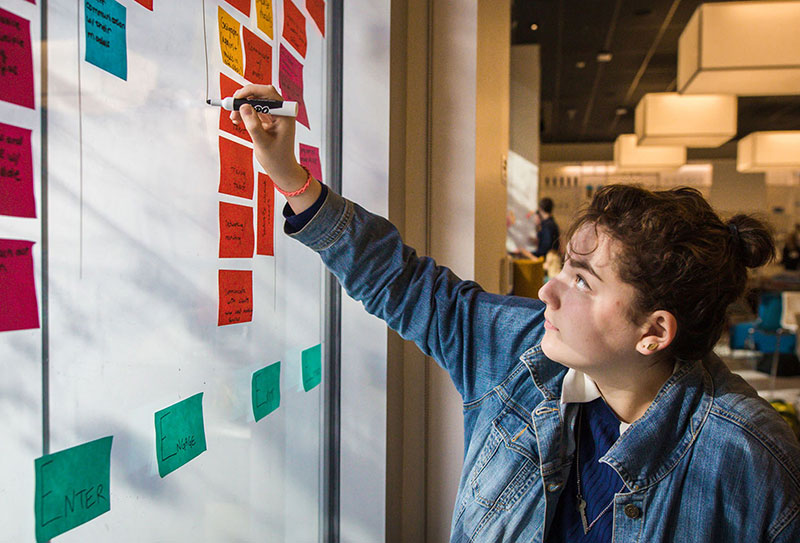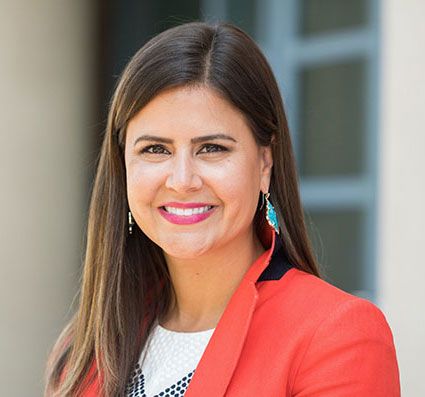By Chris Quirk
Amid the tumult of the COVID spring, as Lehigh students, professors, and administrators adjusted to a new, socially distanced normal, Samantha Dewalt was warily eyeing the quickly approaching summer.
Dewalt is the managing director of Lehigh @ NasdaqCenter, an academic in-residence collaboration with the Nasdaq Entrepreneurial Center. Launched in 2017, L@NC partners with Lehigh’s Western Regional Office, located in the San Francisco Bay Area.
|
L @NC interns, including Sheina Patel ’21, splashed on the Nasdaq Tower in Times Square in celebration of this career path milestone. (Photo courtesy of Nasdaq) |
Each year, L@NC offers two summer programs that sharpen students’ entrepreneurial chops. Startup Academy (a tie-up with Lehigh Business) matches interns with small and mid-size Silicon Valley startups. The Global Entrepreneurial Fellowship (in conjunction with Lehigh’s Baker Institute) places students in startups internationally. Both opportunities attract Rossin College students, many of whom are enrolled in interdisciplinary majors.
With the clock ticking, and COVID-19 cases proliferating, it seemed the pandemic would put the kibosh on the summer opportunities for the 2020 cohort. But Dewalt and James Berneking, L@NC innovation programs manager, were not about to bail on their charges. They lit up their Silicon Valley and global networks, and scoured directories for small, innovative startup operations that could accommodate remote interns. Despite the time crunch—and thanks to some quick logistical footwork—Dewalt and Berneking were able to land virtual placements for the 26 students.
The interdisciplinary nature of Lehigh @ NasdaqCenter internships make the experience particularly valuable for young engineers. “These students bring both the business and technical mindsets to their work—and the combination is powerful,” says Dewalt. “Since the startups we team with are smaller, our students often work alongside the founders and leadership teams, so they have to grasp the business side. They might be thrown into projects using unfamiliar programming languages or tools they’ve never encountered. They’re learning on the fly, and because of their engineering background, they are able to rise to the challenge.”
Sheina Patel ’21, a finance and industrial and systems engineering dual major, and Oliver Walsh ’21, a computer science and business (CSB) major, found themselves working with Ecomedes, which offers software and technology that streamlines sustainable commercial building. Patel began conducting data analytics on target customers, analyzing platform usage, but was quickly moved into creating training videos for clients. She also took over social media duties. “I didn’t have much experience with video editing, so I had to learn a lot of new skills quickly,” Patel says. That included Photoshop, QuickTime, screen recording, and creating snappy scripts that delivered information concisely. “I got to apply a more creative side of myself.”
|
Photo credit: Christa Neu |
CSB majors Dave Jha ’22 and Peter Luba ’22 interned at uGlobally, an international consulting firm. They were tasked with revamping the company’s web presence. “The day we started, they asked us to fix a few things, and as we went through their website, we realized it was kind of disorganized and had reliability issues,” says Jha. “We asked if we could rethink their site and move it to a different platform.”
Jha and Luba got the green light to overhaul the website. “Even though we’re just a couple of young kids, they saw that we were methodical, and we identified a better solution that could address all their issues,” Jha recalls. “It was daunting at first, but we were lucky that the founders trusted us. That’s one of the beauties of entrepreneurship at these small startups—people are taking more risks.” The revamped site went live in July and “everything you see was completely built by us,” Jha says.
These experiences illustrate the advantage of teaming up with smaller startup operations, explains Dewalt. “Mid-stage startups are hungry for talent and offer a unique opportunity for students to work on real, useful projects, often tied to key company objectives.” Because resources are at a premium in these smaller operations, students have to wear a lot of hats. “This is very different from a traditional internship, where you have a specific role. Students have to be creative, and there’s a lot of dynamic ambiguity, so it develops their entrepreneurial mindset,” says Dewalt. “This is the true startup experience.”
It’s a two-way street, according to Kathleen Egan ’90, CEO of Ecomedes. “The interns bring a fresh view, and are able to contribute quickly,” says Egan. “Startups can be daunting, but working on the inside gives interns insight into entrepreneurship. They’re working on valuable projects, because that’s the only kind of projects we have.”
Working remotely rather than on-site in Silicon Valley did not dampen Patel’s assessment of her summer. “I got a lot of good takeaways. I learned about myself and what I might want to do in the future,” she says. “I’ve become more confident, and if someone says, ‘Hey, I need you to get this done,’ even if it’s something I’ve never heard of, I’ll figure it out.”
With a similar can-do mentality, Dewalt and her team found inspiration in their successful recalibration of the center’s offerings to rapidly launch a brand-new track for the 2020–21 academic year. “The Silicon Valley Innovation Internship” came directly out of the experience of going remote with the summer programs. The internship is a high-impact learning opportunity, with students engaging in a real-world internship remotely as they pursue their regular course of studies at Lehigh. “It’s integrated into the curricular experience for students, and they’re getting course credit for participating,” Dewalt says.
“We’re also bringing in industry leaders, entrepreneurs, and investors from the innovation ecosystem here in Silicon Valley to connect with the students and deliver guest lectures. In addition, there will be personal and professional development components.”
Another unanticipated upside of the summer’s remote internships is that students got a taste of what’s to come. “We’re seeing more and more companies move to remote setups—especially some of the major tech firms,” says Dewalt. “This is the future of work.”
(Credit, top photo: Josh Edelson Photography)



